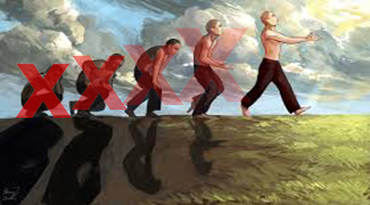Unless you are very clear that a life spent pursuing worldly goals will not remove the feeling of incompleteness and limitation that bedevils most humans, there is little hope for happiness. It is natural to try to secure oneself by obtaining various things, but until you realize that the desire for lasting freedom lurks behind each of your pursuits, you will not be happy. Even an individual who is indifferent to worldly pursuits and tries with psychological means to improve his or herself is actually motivated by a desire for freedom from suffering. A religious person’s desire for heaven or salvation is similarly motivated. It is also true that even healthy morally upright individuals who have secured themselves in worldly ways still feel limited, inadequate and incomplete.
You can count yourself as a spiritual person if you understand that the only choice that is available to you is the direct pursuit of freedom. It is true that when you obtain a worldly goal you feel free, but temporary freedom is nearly as unacceptable as no freedom at all. If by ‘accident’ or God’s grace…which amounts to the same thing…you come to hear that freedom from limitation can be adequately resolved through self knowledge born of self inquiry, consider yourself lucky.
Vedanta equates freedom with self knowledge. If you feel that you are weak, small, inadequate, incomplete and separate, your understanding of your self needs to be corrected because the self is whole and complete and therefore always free. This is not an idea that is easily assimilated owing to the propensity to think otherwise. Ordinarily, spiritual people feel that this tendency can only be eliminated by some kind of epiphany. But experiences of oneness, wholeness and non-separation do not permanently alter the way one sees oneself. Once the experience wears off, the old orientation reappears and the individual is again bedeviled by a stifling sense of limitation.
So to attack the tendency to think incorrectly about oneself, one needs to learn to think differently about the nature of the self. But what is the nature of the self? If I have the wrong notion, what is the right notion? The right notion is that there is only one self, that it is whole and complete, limitless and always free of the objects that seem to limit it. The source of this knowledge, apart from individual insights and epiphanies, is the scriptures that make up the science of self knowledge, or Vedanta. The teachings of Vedanta, whose sole subject matter is the nature of reality, are a means for the realization of the non-dual self.
It is virtually impossible to understand the meaning of the words of scripture and apply the knowledge without the help of a qualified teacher because these teachings are difficult to understand owing to the apparently paradoxical nature of reality and the tendency of the human mind to prefer beliefs and opinions to facts. If they are interpreted by someone who has not realized the nature of the self, the person’s ignorance will skew the meaning, rendering the teachings useless. They will then be assimilated only as beliefs or opinions.
In the Indian tradition the purity of the meaning of the words has been preserved by a system called sampradaya that passes on the vision of the non-dual nature of the self in an unbroken line from teacher to student. Unless the knowledge is preserved as it was originally revealed it will not transform one’s vision.
In these democratic times it is often difficult to accept that certain conditions are required for enlightenment. Assuming a pure scripture and the grace of God, both the teacher and the student need to be qualified. The teacher needs to have realized the truth of the teaching, be a living example of the teaching and have a command of a means of self knowledge. The student needs the kind of mind that can assimilate the meaning of the teachings. Only a discriminating, dispassionate mind that can focus on one idea for a considerable period of time works. If the student’s mind is excessively active or dull it cannot realize the import of the words. When agitation and dullness are removed, the mind is capable of self realization, assuming a burning desire for it.
There are several methods…yogas…that prepare the mind for self inquiry. The base yoga, without which spiritual progress is impossible, is called karma yoga. Karma yoga is an attitude that arises from a clear understanding that an individual’s will is only a contributing, not the determining, factor in the production of the results of action.
What is the determining factor? An analysis of action leads to the following conclusions. Any action takes place in a certain context, the ‘field of action.’ Let’s call it our environment. An action is offered into the field and a result is awaited. When the action is performed it is never clear what the result will be. Sometimes you get what you want, sometimes you get what you don’t want. Sometimes you get nothing. Sometimes you get something that you neither want or do not want. It is anybody’s guess what will happen.
Because the result is not under the control of the doer of action, the determining role of the field…life, to keep it simple…should be appreciated. For want of a better term the field of action is called Isvara in Vedanta or God, if you prefer a more familiar term. Vedanta does not posit a God sitting far away in some transcendental heaven, a being quite separate from its creation. It says that because reality is non-dual, the spiritual principle, consciousness, is both the creator and the laws that comprise the creation.
To understand God is to understand the nature of the field and to understand the nature of the field is to understand the nature of God. It is important to do so because human beings are completely dependent on the field for the results of their actions. When I take a breath I am pleased to discover that existence has supplied oxygen. When I feel hungry I should be grateful that I am not an inhabitant of the moon. When I want results from my actions I should appreciate the role of the field as the giver of the results of my actions.
Doership
If I take full responsibility for the results of my actions, my mind will be continually agitated. I will be anxious about the result. I will be upset when I do not get the result I want. I will be excited when I do. I will be confused or surprised when the result is unexpected. And because my life is nothing more than the continuous results of actions I have done previously as they work their way through the field and come back to me, my mind will be continually disturbed and unable to concentrate consistently on the object of inquiry, the self.
Karma Yoga
The antidote to a grumbling complaining mind disturbed by obsession with results is called karma yoga. Because I am not the ultimate determiner of the results and because the field is, it pays to understand the factors involved in the field and act in accordance with them. The factors involved in the field are the myriad laws governing the behavior of objects in the field, the physical, psychological and moral forces operating there. And because I am not the controller of the results it is obvious that any mental/emotional disturbance concerning what has happened, is happening or will happen is a waste of energy.
If I have the karma yoga attitude, which is simply a glad acceptance of what the field offers (the ‘Grace of God’ if you prefer religious terminology), the energy I put into dealing with my illegitimate emotional reactions to what is going on in my life can be profitably invested in self inquiry, assuming I have a working knowledge of the teachings that are required for a successful inquiry. Without this attitude the mind will never become settled.
Karma yoga asks the individual to see his or her actions as worship. It is logical to feel gratitude to existence because it has given us everything we possess, our bodies and minds and the world in which we are privileged to live. So, instead of devoting my actions to the satisfaction of my ego’s desires and fears, I offer them unreservedly to God. In this way action becomes a means of mental and emotional purification.
Therefore, without an appreciation of the nature of the field and the appropriate attitude, the mind will not gain self knowledge. Everything that happens is governed by God’s laws, including so-called ‘evil’ actions, because nobody exists outside the field of action. A human being is not self-created. It is only a product of innumerable forces and factors. Or if you prefer religious terminology again, we are ‘cast in the image of God.’ We are made out of consciousness and are non-separate from it. The field is consciousness and I am conscious. So there is a basic identity between me and my world.
Consciousness is not personal. Because the universe, the field of action, is impersonal does not mean that it is not consciousness. If it is not consciousness, it could not respond to actions occurring in it. In so far as the field supplies everything I need, it would be useful to develop a good relationship with it.
Although the field, the world in which I act, seems to be outside me, it is actually in me, in consciousness. It seems to be outside because I am conditioned to think of myself as the physical body. So when I invoke the field for a particular result through some kind of action or intention I am actually invoking my consciousness, my self. And when the result comes, even if it seems to come from the outside, it is only experienced in me, in my consciousness, not ‘out there’ in the physical world. If I think an angry thought my consciousness becomes agitated, irrespective of whether or not I act on it. If I think a positive prayerful thought my consciousness becomes composed.
Meditation is a settled mind focused on the reflection of the self as it shines on the mind or it is contemplation on a symbol of the self. Such a mind becomes a vehicle for liberation because self knowledge, like any kind of knowledge, is true to the object. It is only self knowledge that sets the inquirer free because the inquirer is actually the self and the self is always free. Any experiences that happen when the mind is in meditation…lightness, brightness, stillness and expansion…cannot be the self because they are witnessed by the self. What I witness is not me.
If you introduce a positive symbol into the mind and contemplate on it, the mind becomes settled. And if I invoke the symbol for a particular result, the self works through the symbol to give me what I want, in this case knowledge of who I am. It can do this because it is the knower of my thoughts and the giver of the fruits of my actions.
The most common symbol of the giver of the results of my actions is God, the field and the creator of the field. How God is personified by the mind of the individual is less important than the attitude that the individual entertains toward it. Most religions provide God symbols that are suitable for meditation, even those, like Buddhism, that ostensibly claim not to. Even a vague feeling that there is a benign deity is sufficient. Because a symbol is not conscious, it does not care what attitude you have toward it. Many hate God for the perceived injustices he or she has inflicted on them, not realizing that they are actually hating themselves.
And consciousness is equally unaffected by the emotions playing in it. But I am affected by my feelings and emotions, so it pays to cultivate those that are conducive to happiness and eschew that aren’t. Loving feelings purify the mind and unloving feelings disturb it. And because the mind is the vehicle for liberation and liberation is synonymous with self knowledge, it pays to love God if I want to know who I am.
Worship of God as the giver of results is very useful because it removes the stress the ego suffers when it ignorantly assumes that it should be the giver. Because they come from God, I can divine the lesson in negative results. I can connect with the bad values that motivated them and renounce those values.
Worship…simple appreciation of the nature of existence…is superior to prayer in so far as only highly evolved souls are capable of it. But prayer…invoking the self for a specific purpose…is extremely helpful for enlightenment. Prayer involves focusing the mind on a single object for a length of time. First one needs to have the ability to concentrate. For concentration any object will suffice, presumably an activity that one enjoys. Concentration develops mental discipline only. The second stage is concentrating on one’s chosen symbol of God or the teachings of Vedanta. When the mind becomes peaceful it can contemplate on the light of awareness as it reflects in the composed mind. Holding the mind on the self is called inquiry and leads to the realization that the meditator is the self…which is liberation, because the self is free of everything.
To gain a contemplative mind one needs to first accept Vedanta’s contention that one’s own consciousness is not separate from the consciousness in all sentient beings. This means that one needs to know what consciousness is. To get clarity with reference to consciousness, one’s self, Vedanta is a proven means in so far as its teachings, properly assimilated, have set countless individuals free over thousands of years. To get clarity the individual needs to expose his or her mind to the teachings as they are unfolded by a teacher who has been set free by them. Although there are certain benefits to lonely self study of the texts, it is only in the presence of the teacher that the meanings of the scripture become alive and set in motion the purifying power of the knowledge. Exposing one’s mind to the teachings is called faith in Vedanta. It is not blind, however, but faith pending the results of one’s own active contemplation on the meanings of the words of scripture. And, because the result of one’s inquiry, like every other result in existence, is ordained by God, it is wise to worship the Giver and pray for liberation. Liberation is quite possible because the self always present and already free. The teachings of scripture simply remove the beliefs and opinions that stand in the way of one’s appreciation of one’s wholeness and completeness.



